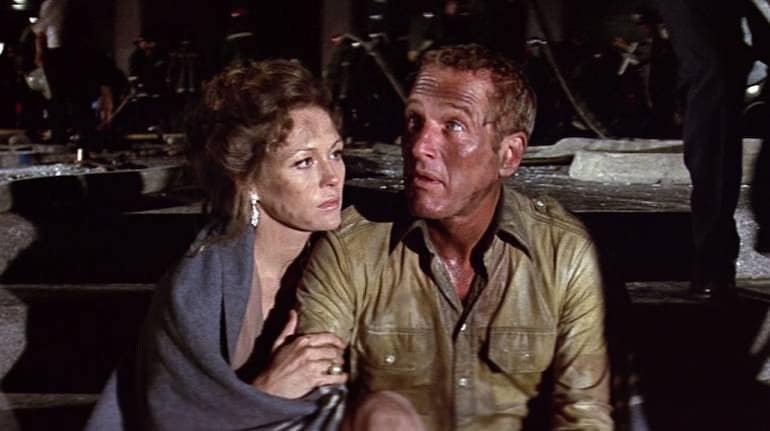50 years of The Towering Inferno: Why Paul Newman, Steve McQueen, William Holden, Faye Dunaway & Fred Astaire's disaster thriller kept audiences glued to the edge of their seats
From Fire! (1901) to The Towering Inferno (1974) and Titanic (1997) - the throughline in Hollywood disaster films that America can't seem to get enough of - and why Indian audiences initially rejected similar offerings from Bollywood.
April 13, 2024 / 10:25 AM IST

Faye Dunway and Paul Newman in The Towering Inferno (1974). While disaster movies often capitalize on spectacle, The Towering Inferno also explored themes of human fragility, and reflected the societal anxieties of its time. (Image source: X / Seventies Films @70sFilm)
Fifty years ago, the flames that engulfed the Hollywood blockbuster The Towering Inferno, ignited not just a movie, but a full-blown cinematic spectacle. The film, made on a budget of $14 million, rounded off a growing trend of disaster films that held audiences in the US spellbound for years.
With a glittering gala, hundreds of guests, and a single spark, all in the world's tallest skyscraper, the movie seemed grounded, the stakes felt painfully real, and a star-studded cast comprising Paul Newman, Steve McQueen, William Holden, Faye Dunaway and Fred Astaire, kept audiences glued to the edge of its seats.
On land, in the high seas or in the air, such disaster movies had always been popular with American audiences. The earliest in the genre is said to be James Williamson's silent film Fire! made in 1901 and depicting a burning house accompanied by heroic firefighting efforts. It was followed by others that explored epic catastrophes. In fact, long before James Cameron’s Titanic hit the screen in 1997, a string of movies like In Nacht und Eis had already dealt with the subject. These films laid the foundation for the disaster movie boom of the 1970s.
Indeed, The Towering Inferno was a continuation of films like 1970’s Airport, a tense drama set aboard a hijacked airplane, which had already shown the way to audiences who craved the adrenaline rush of large-scale cinematic catastrophes. In its wake came The Poseidon Adventure featuring a capsized ocean liner, and Earthquake, which brought a major city to its knees. All these movies shared common elements: edge-of-the seat action, all-star casts facing peril, and the underlying question of who would survive against the odds.
While disaster movies often capitalize on spectacle, The Towering Inferno was more than just a bunch of cheap thrills. Amidst the chaos of a high-rise building on fire, it exposed hubris, explored themes of human fragility, and reflected societal anxieties of its time.
Bollywood, which rarely borrows themes from Hollywood, took a while to buy into the idea. But when it did, we had the execrable The Burning Train in 1980. The disaster on tracks was matched by the accompanying disaster on celluloid as the multicast monstrosity featuring Dharmendra, Hema Malini, Parveen Babi, Vinod Khanna, Jeetendra, Neetu Singh, Vinod Mehra, Simi Garewal and Navin Nischol hammed through the two hours and twenty minutes of sheer hell. One critic of the time called it a metaphor for the Indian economy which at that point was hurtling rapidly into disaster zone but my personal favourite is the 2006 review by Jai Arjun Singh where he applauded audiences who “were courageous enough to stay away from theatres in droves” and dubbed the film “an uncorrupted flop”.
The film’s failure at the box office was a boon. It convinced other wannabe filmmakers that Indian audiences had better tastes than those in the US who rediscovered their relish for mega disasters with Titanic in 1997. Inspired by its huge success, disaster films saw a resurgence in Hollywood through the 2000s. But they were no longer confined to the mould of the 1970s and proceeded to push the boundaries of spectacle with advanced CGI effects. Films like Twister in 1996 brought tornado-chasing action to the screen while Dante's Peak and Volcano in 1997 reignited volcanic disaster thrillers.
The new millennium saw disaster movies take on a slightly more intellectual tack. After Deep Impact and Armageddon in 1998 had explored the threat of asteroid collisions, environmental concerns fuelled The Day After Tomorrow in 2004. By now, film makers had realized that the threat of a few thousands being bumped off wasn’t enough to satiate movie watchers. What was needed was fear of mass extermination, of the whole human race being wiped out by aliens. It produced the realistic Geostorm in 2017 where a network of climate-controlling satellites malfunctions, triggering a series of devastating weather events and also the slightly less credible The Day After Tomorrow.
But my eternal favourite remains Independence Day, the 1996 laugh riot in which an ageing American president flies off to save mankind!
Discover the latest business news, Sensex, and Nifty updates. Obtain Personal Finance insights, tax queries, and expert opinions on Moneycontrol or download the Moneycontrol App to stay updated!













